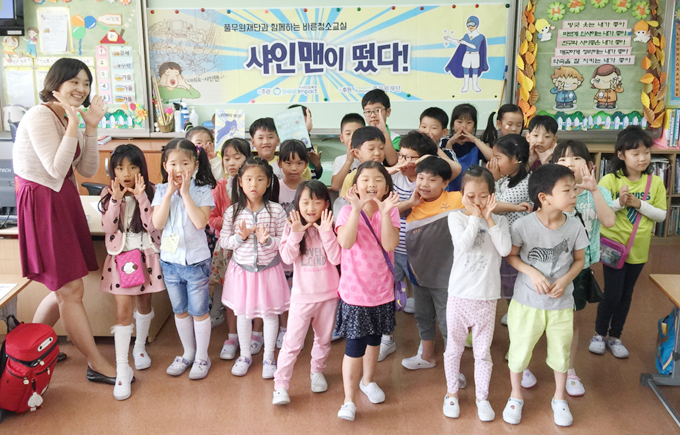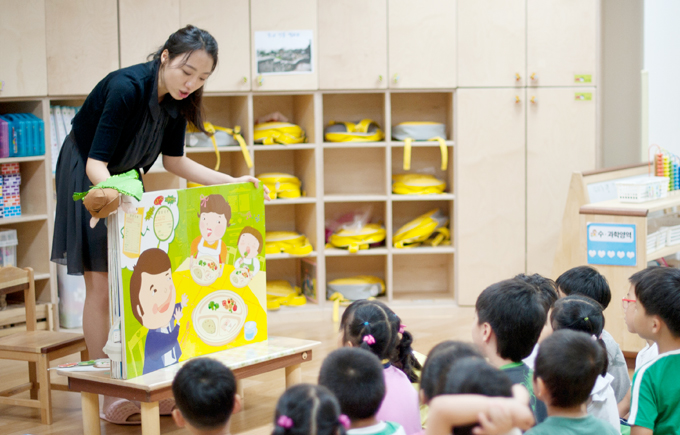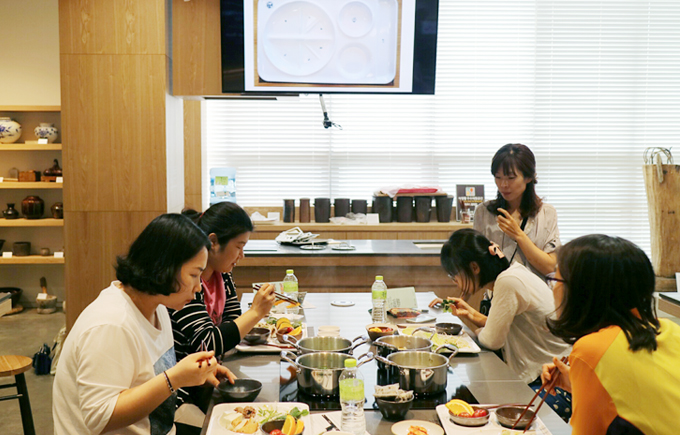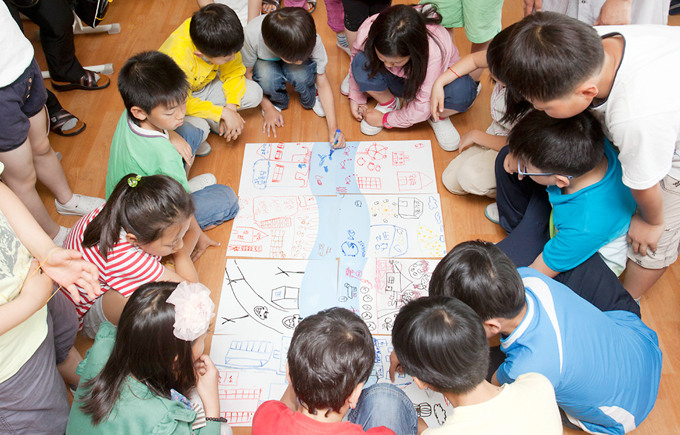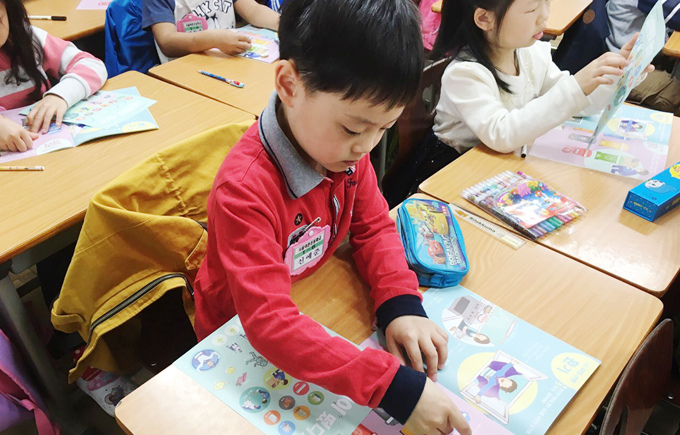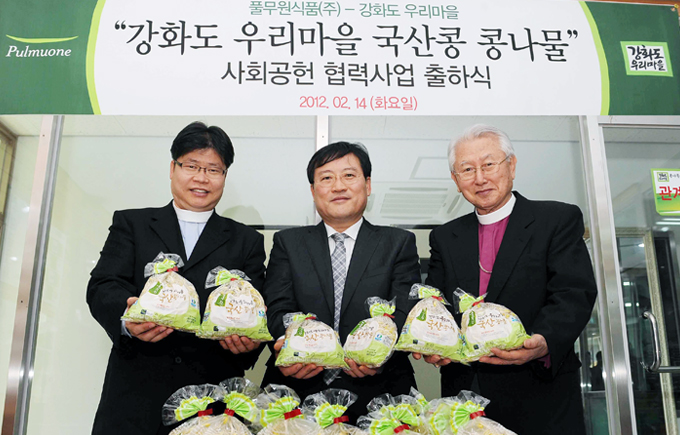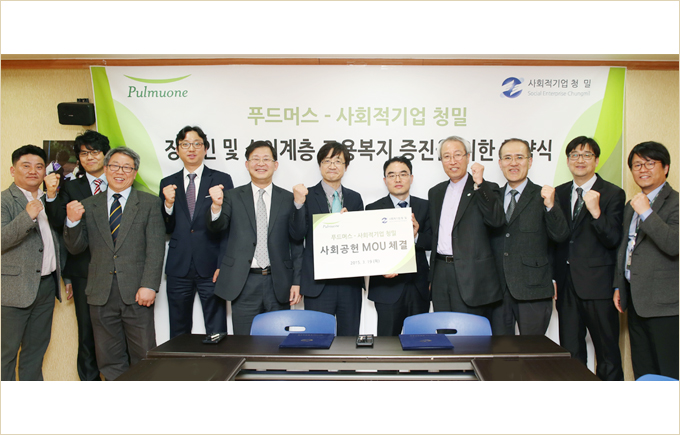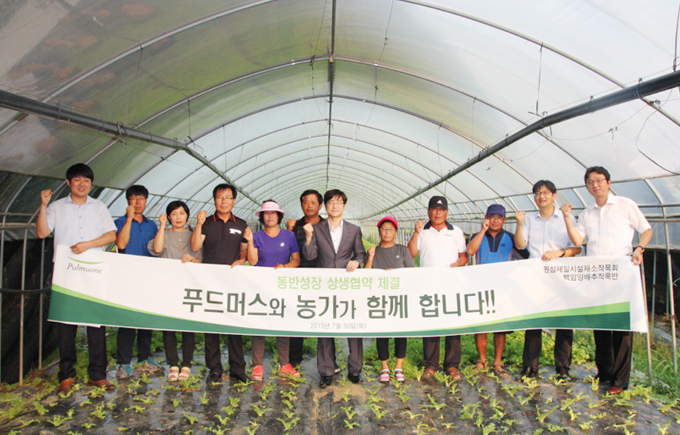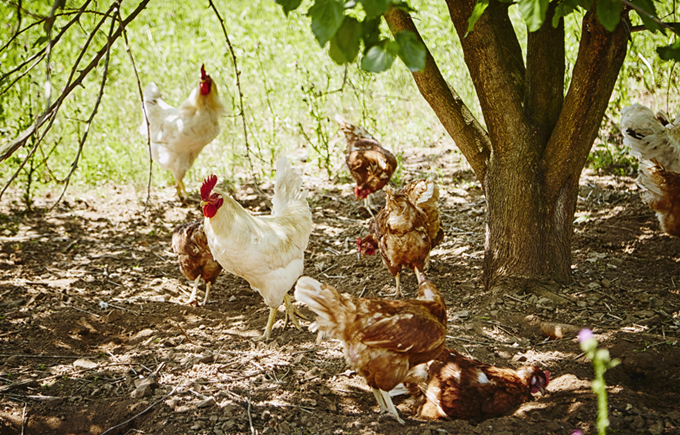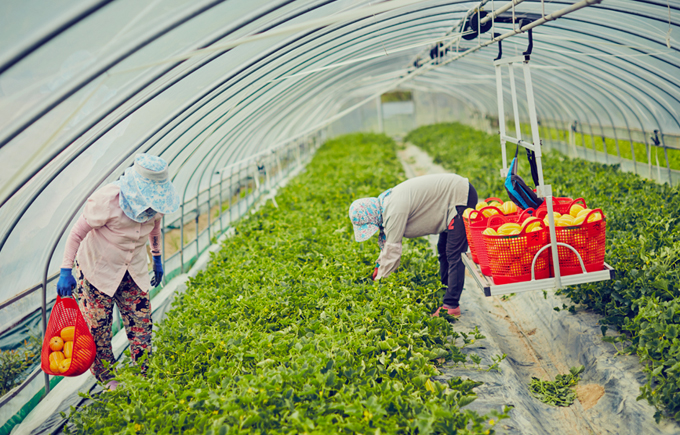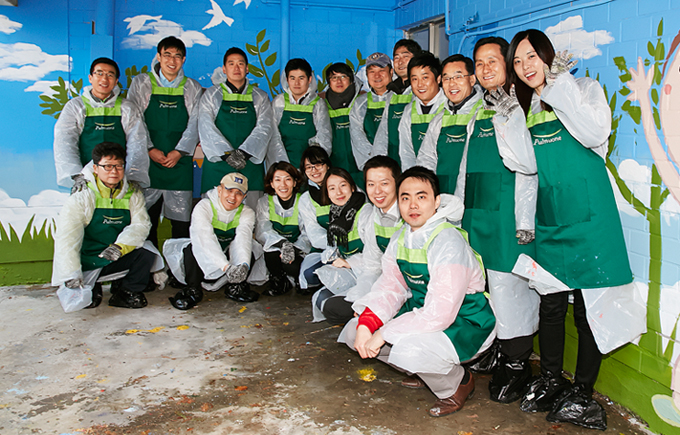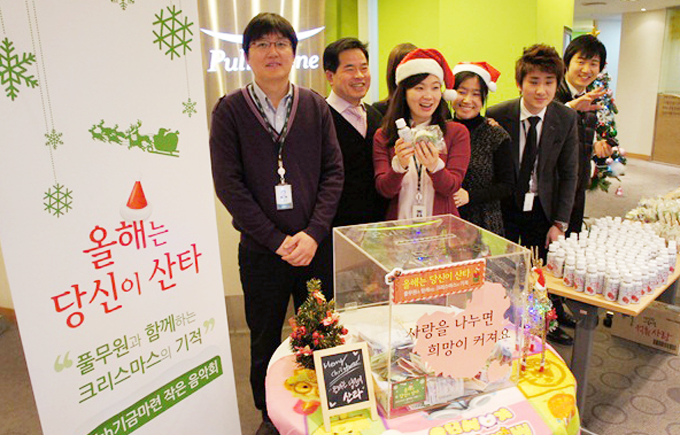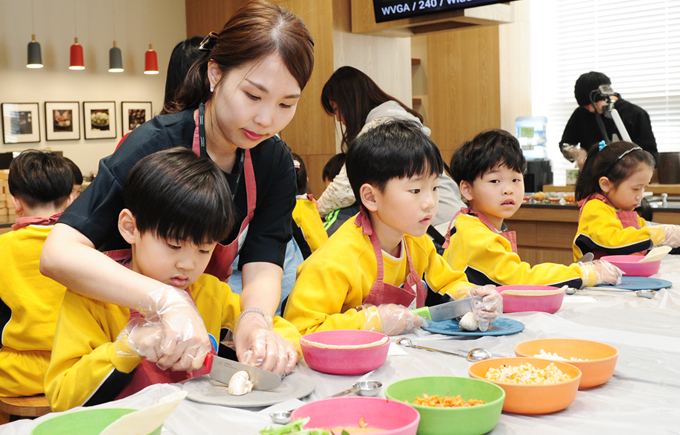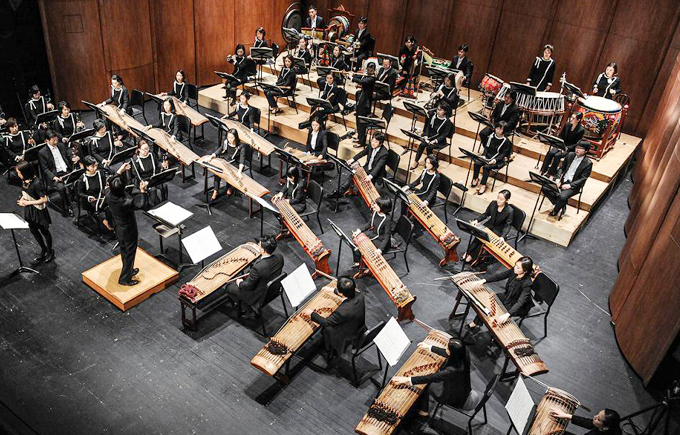- About Us
- Sustainability Management
- Wholesome Foods & LOHAS
- Newsroom
Social Responsibility
With the spirit embodied in our mottos, "love for our neighbors" and "respect for life," we fulfill our social roles and responsibilities.
Mr. Won Kyung-sun, the originator of the Pulmuone spirit as well as a farmer and pacifist, was the first Korean entrepreneur who paid attention to the issue of global famine and began charity work. Mr. Won served as an instructor for Pulmuone's newly hired employees late into his 90s. Whenever he lectured, he shared in detail what to pursue and what to avoid in the name and honor of Pulmuone.
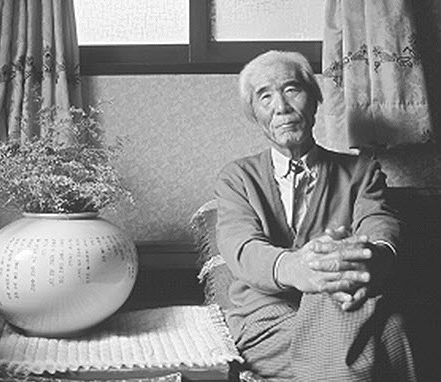
Based on such principles, Pulmuone strives to fulfill its social roles and responsibilities with sincerity. By pursuing the well-being of humanity and the sustainability of the Earth's environment, we seek to realize LOHAS Living and become a sustainable company.
- Pulmuone’s Social Responsibility Outlined in Keywords
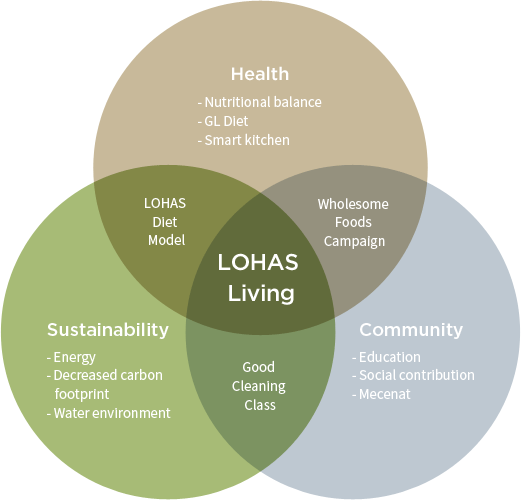
We continue to seek ways to serve the community, conserve the environment, and share what we have achieved – both tangible and intangible – with others.
- Pulmuone Foundation
- Wholesome Foods Education Campaign
- Education on the LOHAS Diet
- Project WET
- Good Cleaning Class
- Bean Sprout Brand “Our Village in Ganghwado”
- Job Creation for the Disabled and Elderly
- Contract Farming
- Eggs from Farms Ensuring Animal Welfare
- GAP-Certified Agricultural Products
- LOHAS Designers
- Love Our Planet Fund and Love Our Neighbors Fund
- Children’s Kimchi School at Museum Kimchikan
- Gugak Concerts with Explanations
Operating the Pulmuone Foundation to reach out to more in need
In 2012, we established the Pulmuone Foundation, a non-profit foundation aimed at systematically conducting community outreach activities. The Pulmuone Foundation engages in a variety of large-scale campaigns across the four areas of wholesome foods, environmental protection, community outreach, and mecenat, all of which have been long-standing activities at Pulmuone.
Wholesome Foods Education Campaign
Pulmuone has provided education on authentic wholesome foods to over 50,000 participants in more than 2,200 sessions since 2010. Our fooducators (food + educators) visit daycare centers, elementary schools, and community child care centers to deliver education on authentic wholesome foods. They teach how to read food labels on packages, understand nutritional value based on the information, and select health-enhancing foods accordingly. They also stimulate interest in unfamiliar foods by guiding children to experience them with all five senses and take an adventurous food journey.
Easy-to-follow practices to realize a true LOHAS diet
We teach parents and children of low-income families about how to follow the LOHAS diet and why it is beneficial for both our health and the planet. Education on a low GL diet (GL stands for Glycemic Load, which shows the effect of food on the blood sugar level) helps parents easily practice a LOHAS diet at home. For children of low-income families who are likely to be exposed to instant foods and fail to maintain a well-balanced diet, we have carried out the LOHAS Diet 2:1:1 since 2015. It is an educational program promoting the importance of consuming fresh vegetables, protein with low saturated fat, and whole grains in the ratio of 2:1:1, jointly conducted by the Pulmuone Foundation and Korean Society of Community Nutrition.
Education on the importance of water
Project WET (Water Education for Teachers) is a global educational program for elementary school students, which focuses on the importance of water and the need to conserve the water environment. It aims to convey easy-to-follow ways to save water and protect the environment, while also promoting a wider recognition of related issues.
Helping children acquire good cleaning habits the fun way
Good Cleaning Class is a LOHAS living educational program targeting children from 6-13 years of age. It is designed to help children acquire good cleaning habits the fun way using games and hands-on experiences. It has been put into operation since 2015 jointly by the Pulmuone Foundation and Shine Impact – a social venture.
Ensuring co-prosperity with the disabled
Our Village in Ganghwado is a non-profit occupational rehabilitation facility built to provide training for intellectually challenged people so they can achieve economic independence. Pulmuone markets eco-friendly bean sprouts produced at this facility. With Pulmuone serving as a stable sales channel, a greater number of people with disabilities have been able to be hired. We have production experts stationed at the facility and provide on-site support for training in order to maintain the quality of the bean sprout products.
Ensuring co-prosperity with underserved members of our society
We strive to reinforce job security for the underprivileged. Pulmuone, in association with Cheongmil, a social enterprise, are hiring disabled people, those over 55 years of age, and women for the C&D Center, a small-quantity packaging facility within Foodmerce, and we are continuing to expand the percentage of these hires. We are also increasing the purchase of products manufactured by companies hiring the elderly and women of rural communities to increase the employment of the underprivileged.
Ensuring co-prosperity with local farms
Foodmerce, a Pulmuone subsidiary, has set up a GAP-certified agricultural product cluster by partnering with local farms in Maeng-ri, Yongin, Gyeonggido, near the C&D Center, a small-quantity packaging facility, and continuously contributed to co-prosperity through contract farming and certification management support. Foodmerce succeeded in securing a network of reliable suppliers of top-quality products by fostering GAP-certified farms, and the farms have been able to secure a reliable source of income. Contracting with farms located within five kilometers of the C&D Center has also led to the reduction of our carbon footprint.
Eggs laid by humanely treated hens
The well-being of animals is directly related to food safety. Fertile Eggs Laid by Humanely Treated Hens is the embodiment of Pulmuone’s belief that healthy eggs come from healthy “free-roaming” hens fed with non-antiobiotic feed at certified humane farms. We strive to increase awareness on animal welfare and produce quality eggs by expanding our group of partner farms that treat hens humanely. ORGA Whole Foods, Pulmuone’s LOHAS living market, has been implementing the nation’s first in-house certification system (ORGA Animal Welfare) since 2007. ORGA Animal Welfare guarantees that the labeled livestock products (Korean native cattle, milk cows, meat chickens, and layer chickens) were raised in accordance with a system designed to prevent diseases and minimize any suffering.
Harmful factors controlled from production through sale
The GAP (Good Agricultural Practices) certification system stringently controls harmful factors that may affect and remain in the farm land, agricultural water, and agricultural products, such as chemicals, heavy metals, and harmful organisms, from production through sale. We continue to uncover GAP-certified agricultural products in association with the Ministry of Agriculture, Food and Rural Affairs to ensure a stable supply of wholesome foods, showcase an increasing number of GAP-certified agricultural products at ORGA Whole Foods stores, and expand technological and consulting support forGAP-certifiedPulmuonesuppliers.
Volunteer group of Pulmuone employees
LOHAS Designers is a volunteer group of Pulmuone employees. The name represents “those who work for the sustainable well-being of our society and neighbors.” LOHAS Designers is divided into the Guardians of Children’s Snacks who educate children about healthy eating through Pulmuone products, the Healthy Foods Sharers who provide support for packaging and delivering side dishes and packed meals for seniors living alone, and the Well-Being Helpers who lend a helping hand around the house for seniors living alone. LOHAS Designers are also active in maintaining Noeul Park, preserving Gyeongbokgung Palace, planting trees, and painting murals.
Funds that mirror our respect for life and compassion for the underserved
In order to practice the respect for life and compassion for the underserved upheld by the Pulmuone brand, we have been donating 0.1% of our sales to the Love Our Planet Fund since 1993. This fund promotes the pursuit of wholesome foods and healthy eating habits, funds activities to improve and conserve the environment, and provides support for underserved neighbors. Employees of Pulmuone also set aside certain amounts of their salaries each month to contribute to the Love Our Neighbors Fund to help our neighbors in need. The two funds are managed and used to support different community outreach activities by the Pulmuone Foundation.
Introducing children to gimjang (traditional kimchi making and sharing in preparation for winter) and kimchi
Children’s Kimchi School is co-planned and co-conducted by the Pulmuone Foundation and Museum Kimchikan (Pulmuone’s kimchi museum located in Insa-dong) targeting preschoolers and elementary school students. Its programs, which are designed to help students easily access and understand kimchi and gimjang by drawing on hands-on experience, are highly popular not only among local residents but also those visiting from abroad.
Gugak (Korean traditional music) concerts with explanations as an extension of mecenat
In order to promote the advancement of and public interest in gugak, Pulmuone has sponsored gugak concerts in association with Sajo Donga One, Sempio, and Samyang since 2004. They are planned by Hwang Jun-yeon – conductor of the Seoul Metropolitan Traditional Music Orchestra and professor emeritus of the Department of Korean Music at Seoul National University – and explained on site by Hwang Byeong-gi – gayageum (Korean zither) virtuoso and professor emeritus of Ewha Woman’s University, thus contributing to familiarizing the public with gugak.

- Pulmuone Foundation
- Wholesome Foods Education Campaign
- Education on the LOHAS Diet
- Project WET
- Good Cleaning Class
- Bean Sprout Brand “Our Village in Ganghwado”
- Job Creation for the Disabled and Elderly
- Contract Farming
- Eggs from Farms Ensuring Animal Welfare
- GAP-Certified Agricultural Products
- LOHAS Designers
- Love Our Planet Fund and Love Our Neighbors Fund
- Children’s Kimchi School at Museum Kimchikan
- Gugak Concerts with Explanations
Operating the Pulmuone Foundation to reach out to more in need
In 2012, we established the Pulmuone Foundation, a non-profit foundation aimed at systematically conducting community outreach activities. The Pulmuone Foundation engages in a variety of large-scale campaigns across the four areas of wholesome foods, environmental protection, community outreach, and mecenat, all of which have been long-standing activities at Pulmuone.
Wholesome Foods Education Campaign
Pulmuone has provided education on authentic wholesome foods to over 50,000 participants in more than 2,200 sessions since 2010. Our fooducators (food + educators) visit daycare centers, elementary schools, and community child care centers to deliver education on authentic wholesome foods. They teach how to read food labels on packages, understand nutritional value based on the information, and select health-enhancing foods accordingly. They also stimulate interest in unfamiliar foods by guiding children to experience them with all five senses and take an adventurous food journey.
Easy-to-follow practices to realize a true LOHAS diet
We teach parents and children of low-income families about how to follow the LOHAS diet and why it is beneficial for both our health and the planet. Education on a low GL diet (GL stands for Glycemic Load, which shows the effect of food on the blood sugar level) helps parents easily practice a LOHAS diet at home. For children of low-income families who are likely to be exposed to instant foods and fail to maintain a well-balanced diet, we have carried out the LOHAS Diet 2:1:1 since 2015. It is an educational program promoting the importance of consuming fresh vegetables, protein with low saturated fat, and whole grains in the ratio of 2:1:1, jointly conducted by the Pulmuone Foundation and Korean Society of Community Nutrition.
Education on the importance of water
Project WET (Water Education for Teachers) is a global educational program for elementary school students, which focuses on the importance of water and the need to conserve the water environment. It aims to convey easy-to-follow ways to save water and protect the environment, while also promoting a wider recognition of related issues.
Helping children acquire good cleaning habits the fun way
Good Cleaning Class is a LOHAS living educational program targeting children from 6-13 years of age. It is designed to help children acquire good cleaning habits the fun way using games and hands-on experiences. It has been put into operation since 2015 jointly by the Pulmuone Foundation and Shine Impact – a social venture.
Ensuring co-prosperity with the disabled
Our Village in Ganghwado is a non-profit occupational rehabilitation facility built to provide training for intellectually challenged people so they can achieve economic independence. Pulmuone markets eco-friendly bean sprouts produced at this facility. With Pulmuone serving as a stable sales channel, a greater number of people with disabilities have been able to be hired. We have production experts stationed at the facility and provide on-site support for training in order to maintain the quality of the bean sprout products.
Ensuring co-prosperity with underserved members of our society
We strive to reinforce job security for the underprivileged. Pulmuone, in association with Cheongmil, a social enterprise, are hiring disabled people, those over 55 years of age, and women for the C&D Center, a small-quantity packaging facility within Foodmerce, and we are continuing to expand the percentage of these hires. We are also increasing the purchase of products manufactured by companies hiring the elderly and women of rural communities to increase the employment of the underprivileged.
Ensuring co-prosperity with local farms
Foodmerce, a Pulmuone subsidiary, has set up a GAP-certified agricultural product cluster by partnering with local farms in Maeng-ri, Yongin, Gyeonggido, near the C&D Center, a small-quantity packaging facility, and continuously contributed to co-prosperity through contract farming and certification management support. Foodmerce succeeded in securing a network of reliable suppliers of top-quality products by fostering GAP-certified farms, and the farms have been able to secure a reliable source of income. Contracting with farms located within five kilometers of the C&D Center has also led to the reduction of our carbon footprint.
Eggs laid by humanely treated hens
The well-being of animals is directly related to food safety. Fertile Eggs Laid by Humanely Treated Hens is the embodiment of Pulmuone’s belief that healthy eggs come from healthy “free-roaming” hens fed with non-antiobiotic feed at certified humane farms. We strive to increase awareness on animal welfare and produce quality eggs by expanding our group of partner farms that treat hens humanely. ORGA Whole Foods, Pulmuone’s LOHAS living market, has been implementing the nation’s first in-house certification system (ORGA Animal Welfare) since 2007. ORGA Animal Welfare guarantees that the labeled livestock products (Korean native cattle, milk cows, meat chickens, and layer chickens) were raised in accordance with a system designed to prevent diseases and minimize any suffering.
Harmful factors controlled from production through sale
The GAP (Good Agricultural Practices) certification system stringently controls harmful factors that may affect and remain in the farm land, agricultural water, and agricultural products, such as chemicals, heavy metals, and harmful organisms, from production through sale. We continue to uncover GAP-certified agricultural products in association with the Ministry of Agriculture, Food and Rural Affairs to ensure a stable supply of wholesome foods, showcase an increasing number of GAP-certified agricultural products at ORGA Whole Foods stores, and expand technological and consulting support forGAP-certifiedPulmuonesuppliers.
Volunteer group of Pulmuone employees
LOHAS Designers is a volunteer group of Pulmuone employees. The name represents “those who work for the sustainable well-being of our society and neighbors.” LOHAS Designers is divided into the Guardians of Children’s Snacks who educate children about healthy eating through Pulmuone products, the Healthy Foods Sharers who provide support for packaging and delivering side dishes and packed meals for seniors living alone, and the Well-Being Helpers who lend a helping hand around the house for seniors living alone. LOHAS Designers are also active in maintaining Noeul Park, preserving Gyeongbokgung Palace, planting trees, and painting murals.
Funds that mirror our respect for life and compassion for the underserved
In order to practice the respect for life and compassion for the underserved upheld by the Pulmuone brand, we have been donating 0.1% of our sales to the Love Our Planet Fund since 1993. This fund promotes the pursuit of wholesome foods and healthy eating habits, funds activities to improve and conserve the environment, and provides support for underserved neighbors. Employees of Pulmuone also set aside certain amounts of their salaries each month to contribute to the Love Our Neighbors Fund to help our neighbors in need. The two funds are managed and used to support different community outreach activities by the Pulmuone Foundation.
Introducing children to gimjang (traditional kimchi making and sharing in preparation for winter) and kimchi
Children’s Kimchi School is co-planned and co-conducted by the Pulmuone Foundation and Museum Kimchikan (Pulmuone’s kimchi museum located in Insa-dong) targeting preschoolers and elementary school students. Its programs, which are designed to help students easily access and understand kimchi and gimjang by drawing on hands-on experience, are highly popular not only among local residents but also those visiting from abroad.
Gugak (Korean traditional music) concerts with explanations as an extension of mecenat
In order to promote the advancement of and public interest in gugak, Pulmuone has sponsored gugak concerts in association with Sajo Donga One, Sempio, and Samyang since 2004. They are planned by Hwang Jun-yeon – conductor of the Seoul Metropolitan Traditional Music Orchestra and professor emeritus of the Department of Korean Music at Seoul National University – and explained on site by Hwang Byeong-gi – gayageum (Korean zither) virtuoso and professor emeritus of Ewha Woman’s University, thus contributing to familiarizing the public with gugak.
Pulmuone’s Social Impact Program
-
Corporate Philanthropy
- Health
-
·Wholesome Foods Campaign & Education
·LOHAS Diet Education
- Sustainability
-
·Project Wet
·Good Cleaning Class
- Community
-
·LOHAS Designer Voluntary Corps
·Donation activities by Pulmuone employees
- Mecenat()
-
·Kimchi School project
·Support for Korean traditional music
-
Corporate Social Responsibility
(CSR)- Environment
-
·Reduce energy consumption
·Reduce water consumption
·Lower greenhouse gas emissions
·Reduce waste disposal
- Employee
-
·Employment policy
·Workplace safety
·Employee health
- Compliance
-
·Compliance program (CP)
-
Creating Shared Value
(CSV)- LOHAS Living
-
·wholesome foods
·Nutritional balance & GL Diet
·Practicing the 5S
- Responsible Sourcing
-
·New Complete Labeling System
·Production History System
- Community Development
-
·Animal welfare
·GAP-certified produce








